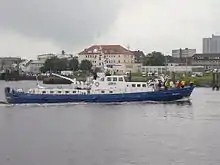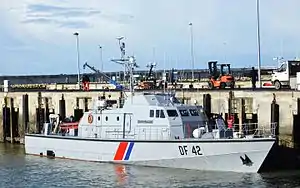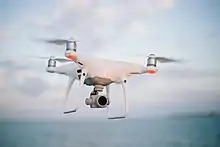| Lebanese Navy | |
|---|---|
| القوات البحرية اللبنانية | |
 Flag of the Lebanese Navy | |
| Founded | 1950 |
| Country | |
| Type | Navy |
| Size | 1,700 personnel 64 Watercraft Interceptors: 24 Patrol: 29 Gun Boats: 8 Landing Crafts: 2 Scientific Boat: 1 |
| Part of | Lebanese Armed Forces |
| Headquarters | Beirut Naval Base |
| Engagements |
|
| Website | Official website |
| Commanders | |
| Current commander | Captain Haitham Dannaoui |
| Insignia | |
| Emblem |  |
The Lebanese Navy (Arabic: القوات البحرية اللبنانية, romanized: Al-qūwātu al-Baḥriyya al-Lubnāniyya, lit. 'the Lebanese Sea Forces') is the navy of the Lebanese Armed Forces. It was formed in 1950 and based in Beirut Naval Base, Lebanon's first naval base. The navy, which currently lacks the proper amount of equipment, has a number of approximately 69 vessels of various sizes and roles; however, the navy is trying to modernize itself, and increase its size. The flag of the Lebanese navy depicts a Phoenician ship with the Lebanese Cedar tree, positioned on an anchor above the Arabic inscription of the navy's name.
The Lebanese government approved on January 16, 2009, a request by the Lebanese Ministry of Defense to build a new naval base on the shores of Nahr el-Bared Palestinian refugee camp in northern Lebanon.[2]
History
The Lebanese Navy forces were established in 1950 and were located in the 1st basin of Beirut Port. In 1972, they were transferred to Jounieh after gaining authority over the buildings of Jounieh Naval Base. After the Lebanese civil war they moved back to the Beirut Naval Base.[3]
2006 Lebanon war
During 2006 Lebanon war, posts of the Naval Forces along the Lebanese coast conducted active early detection operations of drones from the opposing Israeli side. These drones targeted certain posts, leading to casualties and injuries among the military personnel.[3]
The Navy also helped in clearing the petroleum pollution caused by the targeted fuel tanks at the Jiyeh electricity station.[3]
Nahr el Bared Camp
During internal fighting between the Lebanese Army and Islamist groups in the Nahr el Bared camp near Tripoli, the Lebanese Navy stopped and intercepted any supplies from reaching the jihadists and were able to prevent them from escaping through sea.[3]
Rescue operations
Ethiopian Airlines Flight 409 was an international commercial flight scheduled from Beirut to Addis Ababa that crashed into the Mediterranean Sea shortly after takeoff from Rafic Hariri International Airport on 25 January 2010, killing all 90 people on board.[4] On the morning following the crash, Lebanese authorities reported locating the crash site 3.5 kilometres (1.9 nmi) off the coast from the village of Na'ameh, in 45 metres (148 ft) of water.[5] The search for survivors was carried out by the Lebanese Army, using Sikorsky S-61 helicopters, the Lebanese Navy and UNIFIL troops. On 7 February, Lebanese Army divers recovered the plane's flight data recorder and cockpit voice recorder (CVR).[6] The CVR was missing a memory storage unit when found. This was reported on 16 February as having been recovered.[7] All were sent to the French Bureau of Enquiry and Analysis for Civil Aviation Safety (BEA) for analysis. All the deceased were recovered from the sea by 23 February.[8]
Migrant boats
- September 22 2022 – At least 94 people are killed when a boat carrying migrants from Lebanon capsizes off Syria's coast. 9 people survived. Many were declared missing and some were found either dead or injured.[9]
- April 23 2022 – 6 people die and around 50 people are rescued after an overloaded boat sinks in Tripoli, Lebanon.[10]
- September 24 2023 – The Lebanese Navy rescued 27 migrants from a sinking boat off the coast of northern Lebanon.[11]
- October 7 2023 – The Lebanese Navy rescued 124 Lebanese and Syrians on board an illegal immigration boat off the shores of al-Mina.[12]
- December 17 2023 – The Naval forces rescued 51 people from a sinking migrant boat.[13]
Equipment
Current fleet list
| Class | Type | Origin | In Service | Note | Photos |
|---|---|---|---|---|---|
| Patrol boat | |||||
| Advanced Multimission Platform AMP 145 (LOA 43.50 metres) |
Coastal and blue water patrol craft | 41-Trablous | |||
| Marine Protector-class patrol boat (LOA 27.00 meters) | Patrol boat | 3 units 2701 2702 2703[14] |
ex-USCGC Dorado, ex-USCGC Manta, ex-USCGC Shearwater |
_is_brought_to_life_at_Naval_Base_Kitsap.jpg.webp) | |
| Security boat
(Sicherungsboot)34 meters patrol boat |
Security boat | 42 - Amchit (ex-Bremen 2) |
Out of service for lack of spare parts, and placed on shore at jounieh base for training. |  | |
| Avel Gwalarn Class[15] (LOA 30.35 meters/28 knots) |
patrol-boat (Vedette) |
43-Al-Kalamoun (ex-DF 41) |
armed with NEXTER Narwhal 20A (RWS) |  | |
| Todendorf class (LOA 28,90 Meters) |
Security boat (Sicherungsboot) |
42-Tabarja (ex-Y838 Bergen) |
Armed with NEXTER Narwhal 20A (RWS). |  | |
| Fassmer FPB 20 (LOA 20,00 meters) |
308-Nakoura (ex-Bremen 9) |
|
|||
| Attacker class (LOA 20,00 meters) |
Boat | 301-Amchit 305-Beirut 306-Saida 307-Sarafand |
Armed with NEXTER 15A (20 mm cannon). | ||
| Fast interceptor boat | |||||
| Phenix 55 FPB[16] (17 meters/46 knots) |
Speed-boat | Sannine | |||
| Medium Yacht (Captured from a drug smuggler) [17] | Boat | 501-Imanuella | |||
| Small support boat | |||||
| SILLINGER 1200 RAFALE (LOA 11.53 meters) |
High speed interceptor | 4 | Optional:
|
||
| Gun Boats [18] (11 meters) |
RHIB | 8 | _conducts_Visit%252C_Board%252C_Search_and_Seizure_(VBSS)_training_off_the_starboard_side_of_amphibious_assault_ship_USS_Saipan_(LHA_2).jpg.webp) | ||
| SAFE 44 full cabin (13.4 meters) | Boat | 18 | |||
| Landing craft | |||||
| Engin de débarquement d'infanterie et de chars (LOA 59,00 Meters) |
Landing craft | 21-Sour 22-Damour |
 | ||
| Scientific boat | |||||
| Hydrographic/ survey/ (7.5 meters) |
Hydrographic ship | 1 | Housed with sophisticated electronic equipment for carrying out undersea measurements. | ||
| Drones | |||||
| Rotary unarmed drones - Unknown type | Surveillance and reconnaissance drone | 8 | flight duration up to 50 minutes Donated by the UNODC |
 | |
On February 19, 2015, the Saudi press agency quoted on a Saudi official that Saudi Arabia had halted the $3 billion program for military supplies to Lebanon. The Lebanese Navy does not have any operational vessels maneouvrable in difficult weather conditions and undergoes difficulties in accomplishing Search and Rescue missions, Marine Safety, Marine Environmental Protection, Maritime Law Enforcement and the controlling of illegal migrant traffic to Europe. Also, Lebanon intends to provide protection for the future natural gas installations and enforce the Law and State authority in Lebanese territorial waters. Lebanon counts on the US military aid to be equipped with multi-function vessels with a wide range of capabilities such as the RiverHawk OSV 60.
In May 2021, The United States announced that it donate 7 ships to the Lebanese Navy[19]
Coastal Radar Stations
| Lebanese Armed Forces |
|---|
| Organization |
| Personnel |
| Topics of Lebanon |
The Lebanese Navy is in charge of the coastal radar stations, in 1992, three stations in all of Tripoli, Sidon, and Tyre were established, followed by upgrades and new stations in 1997. However, during the 2006 Lebanon War all of the stations were bombed by the Israeli Navy. After the war ended, Germany and Lebanon signed a bilateral agreement to establish The Coastal Radar Organization (CRO) which aimed to create and consolidate a chain of seven coastal radar stations with the ability to cover the entire Mediterranean coast of Lebanon. Three of these stations are older and were refurbished with new equipment and facilities; the four other are new installations.
Surveillance
In February, 2008, the Lebanese navy ordered six Pharos XLR3+ Long Range Multisensor Surveillance Platforms in order to equip their naval stations which lack 24/7 long-range surveillance and reconnaissance capabilities in all weather conditions.[20]
Training
The Lebanese Naval Forces send nearly all of their Navy officers for training abroad in a variety of European countries as well as the United States. Each country offers different training depending on the specializations of each officer. Officers sent to the United States have undergone schooling in surface warfare and experienced on job training with the US Coast Guard. Many Lebanese Naval Forces Engineers head to France where they receive education regarding detection, transmission, and artillery. Skills used in much of the domestic duties of the Lebanese Naval Forces from initial staff courses, amphibious training, and maritime drug enforcement are taught at British academies. The skills of the Lebanese Naval Forces are not incredibly diverse or necessarily advanced to the level of European countries due to their limited human resources and equipments.[21]
Cooperation with the UNIFIL MTF
The existence of the UNIFIL Maritime Task Force is helping the Lebanese Navy to enhance the skills of its personnel through the periodical joint exercises and daily cooperation. Upon the arrival of the MTF to the region (after the 2006 Lebanon War), the Lebanese Navy began jointly working with the navy in lead, which at the time was the Italian Navy, in order to insure a successful outcome to the assigned peace operation.[22]
See also
References
- ↑ United Nations Interim Force in Lebanon Peacekeeping in between the Blue Line
- ↑ "Naval Base on the Shores of Nahr al-Bared Camp". Naharnet Newsdesk. January 16, 2009. Retrieved 2009-01-17.
- 1 2 3 4 "Navy Forces | الموقع الرسمي للجيش اللبناني". www.lebarmy.gov.lb. Retrieved 2024-01-15.
- ↑ Accident description at the Aviation Safety Network. Retrieved on 25 August 2011.
- ↑ "Crash: Ethiopian Airlines B738 near Beirut on 25 January 2010, lost height after takeoff and impacted Mediterranean". The Aviation Herald. Retrieved 25 January 2010.
- ↑ "Black Box Retrieved 14 Days after Ethiopian Plane Crash" (news). Naharnet. An-Nahar. Archived from the original on 10 February 2010. Retrieved 7 February 2010.
- ↑ "Crash: Ethiopian Airlines B738 near Beirut on 25 January 2010, lost height after takeoff and impacted Mediterranean". The Aviation Herald. Retrieved 25 January 2010.
- ↑ "Crash: Ethiopian Airlines B738 near Beirut on 25 January 2010, lost height after takeoff and impacted Mediterranean". The Aviation Herald. Retrieved 25 January 2010.
- ↑ "Death toll from Lebanon migrant boat climbs to 73, minister says". gulfnews.com. 23 September 2022. Retrieved 2022-09-23.
- ↑ Mello, Charbel; Kourdi, Eyad; Alberti, Mia (24 April 2022). "Six drown off Lebanon coast after overloaded boat capsizes, says Lebanese navy". CNN. Reuters. Retrieved 2022-04-30.
- ↑ Ganot, Steven (2023-09-24). "Lebanese Army Rescues 27 Migrants off Northern Coast". The Media Line. Retrieved 2024-01-15.
- ↑ "Lebanon's naval forces rescue 125 immigrants at sea". www.daijiworld.com. Retrieved 2024-01-15.
- ↑ https://english.alarabiya.net/News/middle-east/2023/12/17/Lebanese-army-says-rescued-51-people-from-sinking-migrant-boat-
- ↑ @lebarmyofficial (August 21, 2023). "Arrival of three patrol boats from USA" (Tweet) – via Twitter.
- ↑ "Cérémonie de cession de la vedette française DF41 Avel Gwalarn au Liban" (in French). Ministère de la défense - Marine Nationale. May 27, 2009. Retrieved 2009-05-28.
- ↑ Wertheim, Eric (2007). The Naval Institute Guide to Combat Fleets of the World. 291 Wood Road, Annapolis: Naval Institute Press. p. 446. ISBN 978-1-59114-955-2.
{{cite book}}: CS1 maint: location (link) - ↑ "Lebanese Navy receives 8 gunboats from America". April 14, 2014.
- ↑ "The Lebanese Navy is Getting 7 New Offshore Patrol Vessels". 8 June 2021.
- ↑ "Lebanese Navy Order Pharos Long Range Multi-Sensor Surveillance Platform". Advanced Imaging Pro. February 14, 2008. Retrieved November 28, 2008.
- ↑ "Lebanese Navy". GlobalSecurity.org. Retrieved November 28, 2008.
- ↑ "UNIFIL MTF and the Lebanese Navy cooperation and contribution to PSO" (PDF). Rear Admiral (UH) Ali EL MOALLEM. Retrieved 2008-12-29.